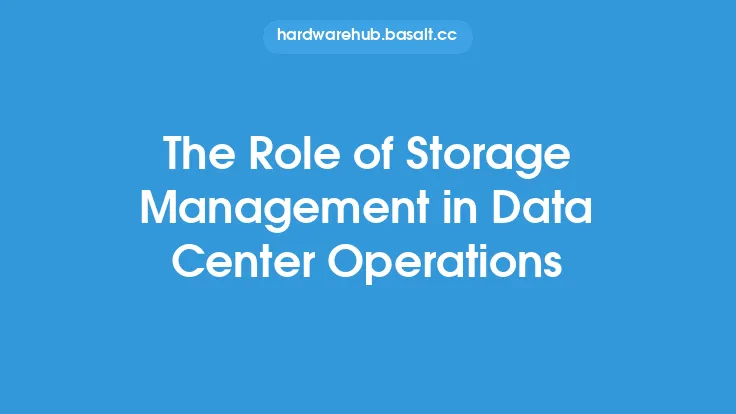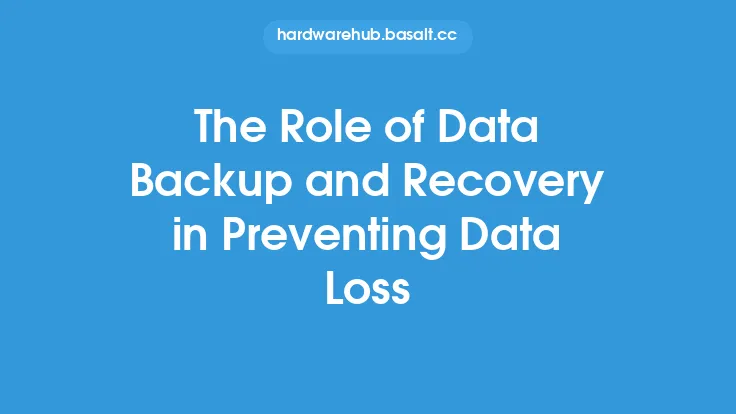In today's fast-paced, data-driven world, enterprises rely heavily on their IT infrastructure to support their operations, drive innovation, and maintain a competitive edge. A crucial component of this infrastructure is the storage server, which plays a vital role in storing, managing, and providing access to the vast amounts of data generated by modern businesses. Storage servers are specialized computers designed to store, manage, and retrieve data, and they are a fundamental part of any enterprise environment.
Introduction to Storage Servers
Storage servers are designed to provide a centralized repository for data, allowing multiple users and applications to access and share files, documents, and other digital content. They typically consist of a combination of hardware and software components, including disk drives, storage controllers, and operating systems. Storage servers can be deployed in a variety of configurations, including direct-attached storage (DAS), network-attached storage (NAS), and storage area networks (SANs). Each configuration has its own strengths and weaknesses, and the choice of which to use depends on the specific needs of the enterprise.
Key Features of Storage Servers
Storage servers offer a range of features that make them an essential component of enterprise environments. Some of the key features of storage servers include:
- High-capacity storage: Storage servers are designed to store large amounts of data, making them ideal for enterprises with significant storage needs.
- Scalability: Storage servers can be easily scaled up or down to meet changing storage needs, making them a flexible solution for growing businesses.
- Performance: Storage servers are optimized for high-performance data access, making them suitable for applications that require fast data transfer rates.
- Reliability: Storage servers are designed to provide high levels of reliability and uptime, ensuring that data is always available when needed.
- Security: Storage servers often include advanced security features, such as encryption and access controls, to protect sensitive data.
Types of Storage Servers
There are several types of storage servers available, each with its own strengths and weaknesses. Some of the most common types of storage servers include:
- NAS (Network-Attached Storage) servers: These servers are designed to provide file-level access to data over a network. They are often used for file sharing, collaboration, and data archiving.
- SAN (Storage Area Network) servers: These servers are designed to provide block-level access to data over a dedicated network. They are often used for applications that require high-performance data access, such as databases and virtualization.
- DAS (Direct-Attached Storage) servers: These servers are designed to provide direct access to data for a single server or application. They are often used for applications that require low-latency data access, such as video editing and scientific simulations.
- Object storage servers: These servers are designed to store and manage large amounts of unstructured data, such as videos, images, and documents. They are often used for cloud storage, data archiving, and big data analytics.
Storage Server Architecture
Storage servers typically consist of a combination of hardware and software components. The architecture of a storage server can vary depending on the specific implementation, but most storage servers include the following components:
- Disk drives: These are the physical devices that store data. Disk drives can be traditional hard disk drives (HDDs) or solid-state drives (SSDs).
- Storage controllers: These are the components that manage data access and storage. Storage controllers can be hardware-based or software-based.
- Operating system: This is the software that manages the storage server and provides a interface for users and applications to access data.
- Network interfaces: These are the components that connect the storage server to the network. Network interfaces can include Ethernet, Fibre Channel, or other types of connections.
Storage Server Protocols
Storage servers use a variety of protocols to communicate with clients and other devices on the network. Some of the most common storage server protocols include:
- NFS (Network File System): This is a protocol used for file-level access to data over a network.
- SMB (Server Message Block): This is a protocol used for file-level access to data over a network.
- iSCSI (Internet Small Computer System Interface): This is a protocol used for block-level access to data over a network.
- Fibre Channel: This is a protocol used for block-level access to data over a dedicated network.
Benefits of Storage Servers
Storage servers offer a range of benefits to enterprises, including:
- Improved data management: Storage servers provide a centralized repository for data, making it easier to manage and maintain.
- Increased scalability: Storage servers can be easily scaled up or down to meet changing storage needs.
- Enhanced performance: Storage servers are optimized for high-performance data access, making them suitable for applications that require fast data transfer rates.
- Better security: Storage servers often include advanced security features, such as encryption and access controls, to protect sensitive data.
- Reduced costs: Storage servers can help reduce costs by providing a more efficient and effective way to store and manage data.
Best Practices for Implementing Storage Servers
When implementing storage servers, there are several best practices to keep in mind. These include:
- Assessing storage needs: Before implementing a storage server, it's essential to assess the storage needs of the enterprise.
- Choosing the right storage server: The choice of storage server will depend on the specific needs of the enterprise.
- Configuring the storage server: The storage server should be configured to meet the specific needs of the enterprise.
- Monitoring and maintaining the storage server: The storage server should be regularly monitored and maintained to ensure optimal performance and reliability.
Conclusion
In conclusion, storage servers play a vital role in enterprise environments, providing a centralized repository for data and enabling multiple users and applications to access and share files, documents, and other digital content. By understanding the key features, types, and architecture of storage servers, as well as the protocols and benefits they offer, enterprises can make informed decisions about their storage needs and implement effective storage solutions that meet their specific requirements. By following best practices for implementing storage servers, enterprises can ensure that their storage infrastructure is optimized for performance, reliability, and security, and that it provides a solid foundation for their IT operations.





